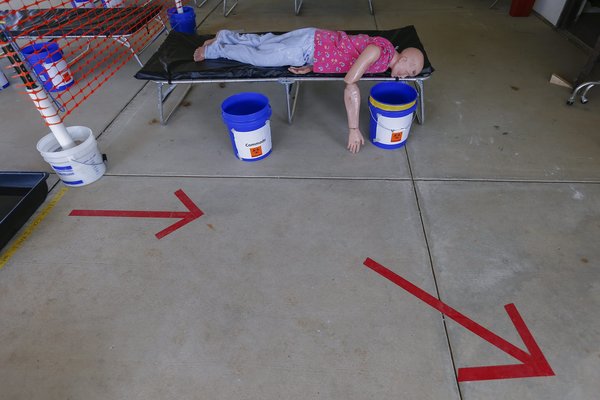You are here
Lax U.S. Guidelines on Ebola Led to Poor Hospital Training, Experts Say
Primary tabs
NEW YORK TIMES Oct 15, 2014
By DONALD G. McNEIL Jr.

A dummy depicting an Ebola patient was part of a C.D.C. training session for health care workers Wednesday in Anniston, Ala. Credit Erik S. Lesser/European Pressphoto Agency
Federal health officials effectively acknowledged the problems with their procedures for protecting health care workers by abruptly changing them. At 8 p.m. Tuesday, the Centers for Disease Control and Prevention issued stricter guidelines for American hospitals with Ebola patients.
They are now closer to the procedures of Doctors Without Borders, which has decades of experience in fighting Ebola in Africa. In issuing the new guidelines, the C.D.C. acknowledged that its experts had learned by working alongside that medical charity.
The agency’s new voluntary guidelines include full-body suits covering the head and neck, supervision of the risky process of taking off protective gear, and the use of hand disinfectant as each item is removed.
See full story



Comments
The Problem is Not Just Lax Rules, It is Compliance
Every year, there are approximately 1.7 million health care-associated infections in the United States. Just under 100,000 deaths are attribiuted each year to Nosocomial illness (deaths associated with treatment in hospitals and clinics) related to health care-associated infections. Health care facilities are able to treat many dangerous infections, but we have to also recognize that health care facilities can be sources of new infections -- including with Ebola.
We have already witnessed the difficulty of managing Ebola in the circumstances of Mr. Duncan, the Liberian man that brought the Ebola virus to Dallas infecting two nurses. Even in professional care settings Ebola infections can be difficult to contain, including when advanced personal protective equipment is used. The problem does not primarily lie in the laxness of the rules for managing infections associated with Ebola Virus Disease, and other infectious diseases.
There are also severe challenges in compliance with infectious disease management rules day in and day out. It is possible that Ebola may improve compliance, but human error will remain a key factor in the spread of Ebola, and other infectious diseases. This means that no matter how sophisticated we believe our health systems are in the U.S. and Europe, we still have to prepare for managing community spread of Ebola in the U.S. as well as in West Africa through certified Ebola-resilient Areas, as an inherent element of the Phase II Ebola Epidemic Management Initiative.